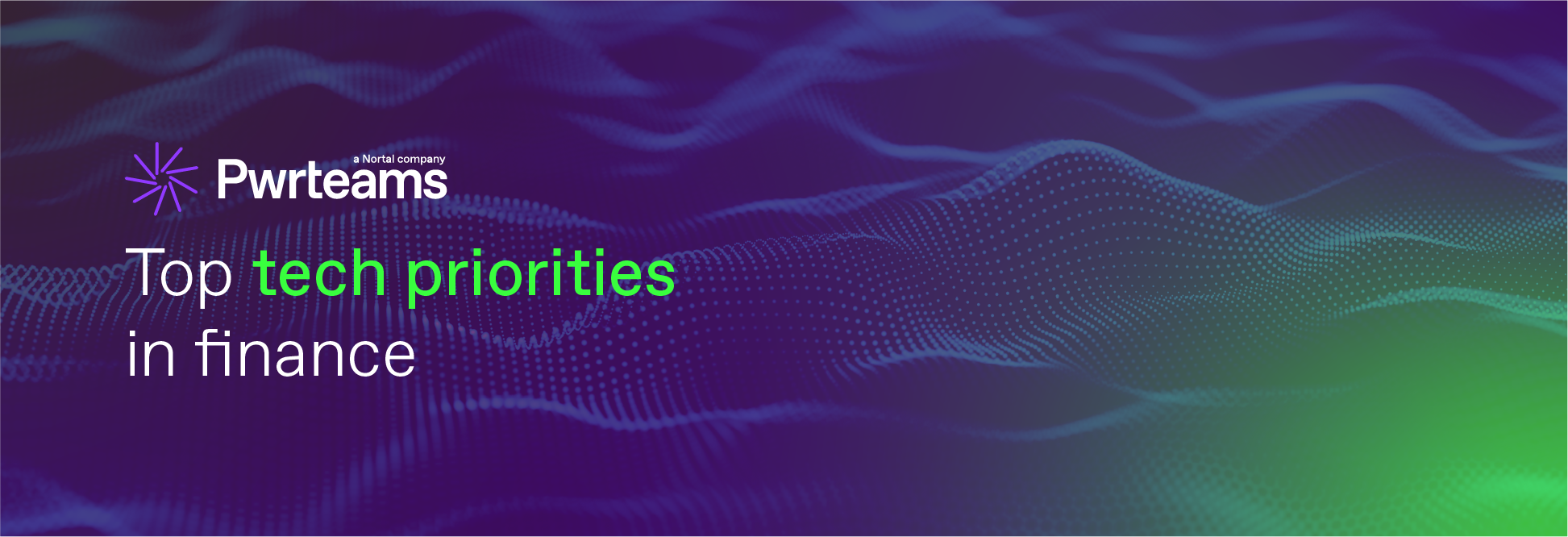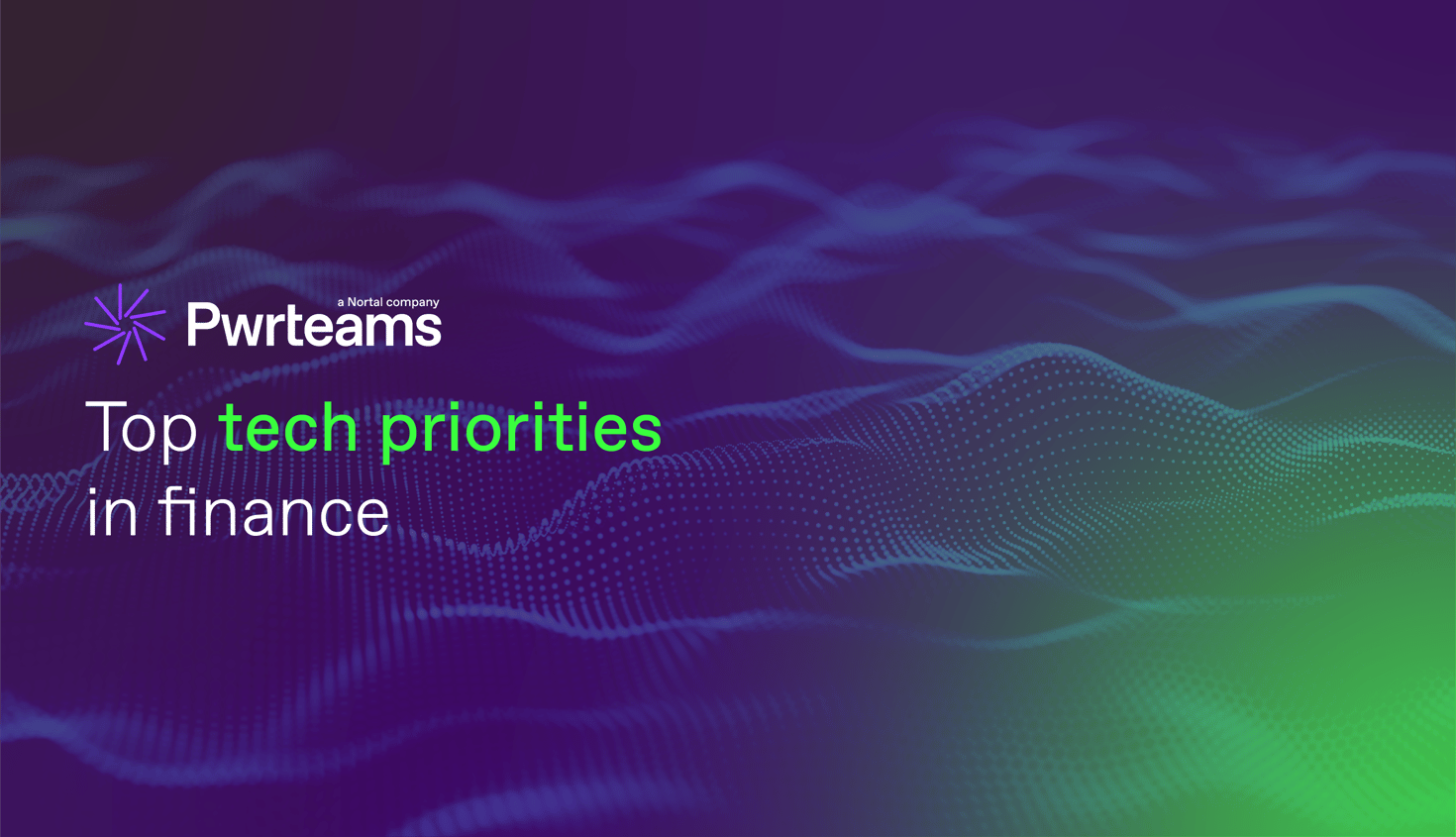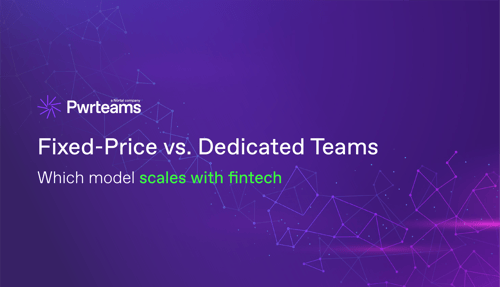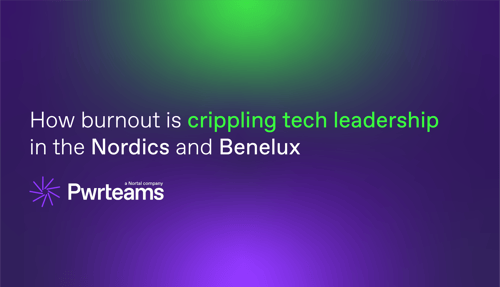Top tech trends driving fintech success in 2025


What makes fintech special for me? Each project is different. Every challenge–unique. Innovation never stops, and that's what keeps it exciting. I base that off the last five years as a Client Partner, linking banking and finance companies to people who empower their success. Each day, I interact with customers who are pushing the limits of what's possible, making my work incredibly rewarding.
One example is our long-term client, a fintech that transformed SME lending. Their goal is to offer affordable financing for businesses while providing investors with solid returns. For that, they need a comprehensive solution that covers all the bases, from security to scalability.
To deliver it, the company integrated our tech experts into their in-house team to support them in developing advanced algorithms and machine learning models that help speed up credit processes while staying accurate. Together, they designed a user-friendly platform to make things seamless for borrowers and investors. By automating workflows, they cut down on manual work, while ensuring regulatory compliance and adding robust security measures to keep the data safe.
Working on projects like this gives me a clear and hands-on understanding of fintech organisations' goals and challenges. Seeing firsthand what technologies help them grow and what slows them down, I've come up with a few predictions for 2025 on which areas fintech companies should focus on to stay ahead and profitable. Join me as I unveil them one by one.
Key goals for fintechs in 2025
What tech and skills will fintechs need in 2025? And where should they turn to speed up launches and strengthen expertise? Here's a quick look.
Focus on scalability
Without scalability, there's no sustained growth. Even when a software provider promises a future-ready platform, scaling it to meet current demand often requires specialised tools and expertise that in-house teams simply might not have.
Meanwhile, even the most promising companies can fail if they don’t scale fast enough. Let me tell you about Clinkle, a mobile payment startup. Despite raising $30 million for growth, they couldn't keep up without a scalable infrastructure and ultimately failed. That’s because ensuring scalability is easier said than done.
To avoid this, fintechs need a solid but flexible tech foundation. For example, that of cloud-native services, which allow scaling resources based on demand without the headaches of managing infrastructure. Microservices architecture is another option, letting services scale independently without disrupting the entire platform. Similarly, thanks to the loose coupling of event-driven architecture components, fintechs can easily add and remove services while keeping the core functionality intact.
But building for scale requires a combination of skills that is often hard to find fast. Turning to expert staff augmentation partners is the quickest way to resolve this. At Pwrteams, you typically only need 4-8 weeks to get started with a team experienced in building scalable architectures.
Make your fintech solution future-ready with scalable tech solutions. Build your dream team of Cloud Architects, DevOps Leads, DevOps Engineers, Software Developers, and Data Engineers.
Optimise operational workflows with AI
How about replacing inefficient methods with easier processes that bring the same or better results in less time? That’s what operational efficiency is all about, and AI and machine learning are great enablers. They help fintechs make smarter and faster decisions by analysing data and predicting outcomes. This way, you can complete tasks sooner, allocate energy elsewhere, and achieve more. All sound like great goals to aspire to meet next year!
For example, AI can sift through large data volumes to find unusual patterns and detect fraud in real time. Aware of these potential threats, you can respond much faster, keeping your and your clients’ data secure and your reputation unspoiled. Using smart tech, you can also analyse customer behaviour and market trends in-depth, and get proactive insights to improve your products and services. Think about customer churn prediction, for instance. Knowing when a customer may leave (and why) allows you to act before they even consider that. AI can help you with this.
In addition, artificial intelligence can detect patterns in complex data structures that may be too overwhelming for more traditional data solutions. And it keeps improving, with artificial neural networks acting as a digital version of the human brain. They can be trained to recognise images and process data that comes in order, like language or time series. This deep learning ability can be a major advantage for fintechs, from making stock market predictions more accurate to enhancing credit card fraud detection.
Remember that not all AI projects hit the mark. On the contrary, without the right resources, many of them fail. Developing AI and machine learning solutions is a whole different game than traditional software development. From relying on large datasets to ongoing adjustments and dealing with less predictability than standard coding, AI and ML projects have their own challenges that call for specialised skills.
A big reason for many AI project flops is the lack of expertise in productising and monetising smart tech. How can you resolve that in 2025? Expert AI and ML staff augmentation is one of the fastest and most reliable ways.
Drive efficiency company-wide with AI and machine learning solutions. Build your dream team of AI Engineers, ML Engineers, NLP Developers, Data Engineers, Data Architects, and Data Scientists.
Automate routine tasks
One issue I repeatedly experience with fintech companies is a pile of regulatory "paperwork". From managing documents and monitoring transactions to performing know-your-customer (KYC) checks and generating reports, these routine tasks are tedious and prone to errors. Devouring precious energy and time, they divert valuable resources from strategic initiatives.
What I’ve noticed lately among fintech clients is their increased interest in regtech, which automates regulatory management to reduce compliance headaches. After all, who wouldn’t want to make legal document management and reporting smoother? Seeing the benefits regtech solutions can bring, it’s no wonder that 25% of risk and compliance professionals actively seek them to resolve regulatory challenges more effectively. Global spending on regtech, projected to grow by 124% between 2023 and 2028, reflects that.
But again, implementing regtech or other automation solutions isn’t as easy as it might seem, especially when integrating with legacy platforms. Another area that often comes up in my talks with clients are security and data privacy concerns. That’s where I like to step in and explain how regtech can actually boost data protection. By automating compliance and monitoring data flows, companies get the tools to spot risky behaviours early on. It’s all about creating more secure and efficient operations. And our dedicated automation experts can help you achieve that faster.
Meet all regulations while automating monotonous tasks for greater efficiency and speed. Build your dream team of Business Analysts, Automation Engineers, Software Developers, Security Analysts, Data Engineers, Data Scientists, and Data Architects.
Make your solutions accessible
Financial and banking services should be easily available to everyone. By not making them accessible, fintechs are excluding about 1.3 billion people worldwide who experience disabilities. Meanwhile, many existing technologies can make managing one’s financials more inclusive and with a relatively low effort. So, adding accessibility to your list of 2025 goals should be a non-negotiable.
Take gesture-based interfaces. They use motion sensors to read and interpret movements. This can be game-changing for users who struggle with traditional input methods. Eye-tracking technology is another great tool, allowing users to navigate fintech platforms using just their eyes. For someone with mobility challenges, adding this simple feature can be a life-changing experience.
One of my favourite examples of fintechs that use those tech advancements is SpendAble, an Australian app that gives people with disabilities control over finances and protects them from financial abuse. They can easily view transaction receipts, set spending limits for caregivers, and manage payments in real time. Another pioneering instance comes from the UK. Barclays bank designed audio ATMs that help visually impaired users withdraw cash and check their balance safely and independently. The bank’s online platform offers voiceover functionality for screen readers and compatibility with accessibility features on smartphones. These features make it easy for anyone to access and use the app.
Accessibility becomes a cross-industry trend; as the world embraces it, your fintech products should, too. While adding features to improve access for people with disabilities may be relatively simple, from my experience, I’d advise against a patchwork approach. Instead, easy access should be built into your software products right from the start. If you need experienced teams to help make that happen, rely on us!
Make your solutions available to everyone. Build your dream team of UX Designers, AI Engineers, ML Engineers, Software Developers, NLP Developers, and DevOps Engineers.
Promote financial inclusion
Fintech has the potential to reach places that traditional financial services can’t. For example, regions like Sub-Saharan Africa, where fragmented banking systems, distance, and high remittance fees create barriers. Blockchain can help by eliminating costly intermediaries, speeding up transactions, and improving system interoperability.
Blockchain-powered solutions, such as cryptocurrencies and decentralised exchanges, give people power to join the global economy, especially in areas with limited banking infrastructure. Similarly, mobile wallets, preferred by 68% of consumers, also offer financial freedom to marginalised populations.
With 1.4 billion adults still unbanked, there’s a huge untapped potential there. If your company is ready to explore possibilities of catering to that market, we can quickly provide teams experienced in developing finance and banking solutions that promote equal opportunities.
Add your voice to financial inclusion and build products that reach a new customer base. Build your dream team of Blockchain Developers, Software Developers, UX Designers, AI Engineers, Data Architects, Data Engineers, and DevOps Engineers.
Focus on user-friendly interfaces
Throughout my career, I’ve seen many great fintech products fall short because of poor interfaces that instantly turned customers away. Finances are complex enough; using financial apps shouldn’t be.
There are a few key elements all intuitive platforms have in common: simple layout, fast performance, clear instructions, and consistent design. Behind these features are advanced technologies that make using fintech apps smoother, faster, and more rewarding.
Biometric authentication is a classic example, yet many fintech products still don’t include it. Meanwhile, fingerprint scanning and facial recognition enhance security and convenience–no need to remember or type in passwords that are easy to forget or hack. Gamification and rewards engines are another great way to keep users engaged, especially when dealing with finances–not the most exciting subject for most people.
Often, good UX comes down to small touches. Such as microinteractions, those subtle moments of feedback or guidance. They help users move through a finance or banking app without confusion, making all tasks less stressful. For instance, showing a summary before the final payment step eases users’ anxiety. Afterwards, a confirmation screen or, better, personalised email reassures them that everything went smoothly. Another small detail that can make a big difference is a pre-filled form or an easy copy-and-paste feature, especially when entering credit card payments or tax information.
Those are just a few examples, but the possibilities are endless. An experienced team of fintech-oriented tech specialists will help you examine all and choose those that make the most sense for your business.
Turn using your fintech platform or app into an adventure! Build your dream team of AI Engineers, Data Engineers, Software Architects, Software Developers, UI Experts, and UX Designers.
There’s no tech future without people
Fintech moves fast, powered by constant innovation. But at its heart, there are always people who spark ideas and bring them to life.
2025 is not here yet, but now is the right time to think ahead and start building a hiring strategy to make it a successful year. Is your goal to expand reach, improve customer experience, or make financial services more inclusive? Maybe all of them? Whatever it is, technology will be crucial to achieve it. And to build technology, you'll need the right skills.
Let me help.
It's my role and my deep dedication to connect fintechs with adept tech teams who help them succeed. Ready to bridge that gap? Reach out, and let's chat about doing it together.
 September 29, 2025
September 29, 2025
Build your team or extend with ours? Here’s what helps fintech CTOs decide
Read the post September 10, 2025
September 10, 2025
Fixed-price projects vs dedicated teams: A fintech CTO comparison
Read the post September 3, 2025
September 3, 2025
How burnout is crippling tech leadership in the Nordics and Benelux
Read the post September 29, 2025
September 29, 2025
Build your team or extend with ours? Here’s what helps fintech CTOs decide
Read the post September 10, 2025
September 10, 2025
Fixed-price projects vs dedicated teams: A fintech CTO comparison
Read the post September 3, 2025
September 3, 2025
How burnout is crippling tech leadership in the Nordics and Benelux
Read the postWrite your own
success story
with Pwrteams!
Share your details in the form, tell us about your needs, and we'll get back with the next steps.
- Build a stable team with a 95.7% retention rate.
- Boost project agility and scalability with quality intact.
- Forget lock-ins, exit fees, or volume commitments.